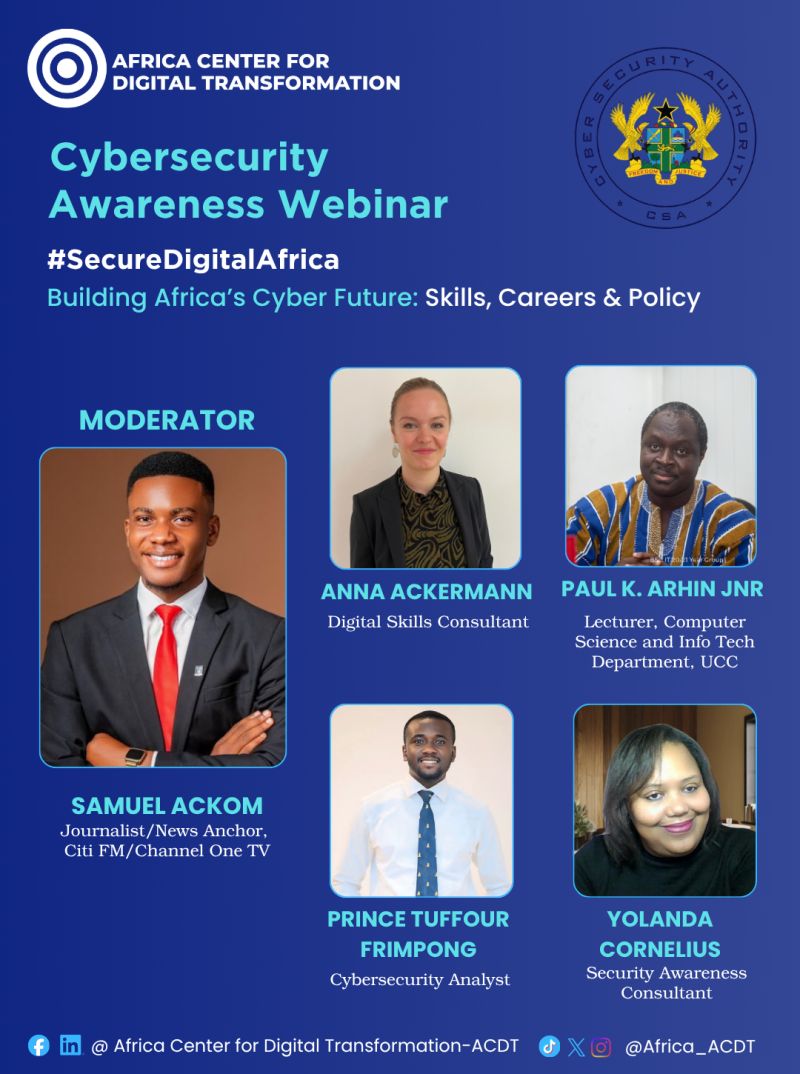Cybersecurity Awareness Webinar 2.0
Skills, Careers & Policy for Africa’s Digital Future
The Africa Center for Digital Transformation (ACDT) hosted the second edition of its Cybersecurity Awareness series, focusing on empowering Africa’s digital workforce with the right skills, policies, and career pathways for a secure digital future.
Read Program ReportAs part of its month-long #SecureDigitalAfrica campaign during Global Cybersecurity Awareness Month, the Africa Center for Digital Transformation (ACDT) hosted the second edition of its Cyber Security Awareness Webinar Series. This session focused on the intersection of skills development, career opportunities, and policy frameworks, with the aim of equipping Africans—especially young professionals, students, and civil society actors— with the knowledge needed to navigate and secure the continent’s digital future.
Moderated by Samuel Ackom, broadcast journalist at CitiTV, the webinar welcomed participants from across Ghana, Sierra Leone, Nigeria, Kenya, Canada, Cameroon, Germany, South Africa, and beyond. Samuel opened the event by highlighting the increasing importance of cybersecurity across all sectors of society, noting that Africa’s digital growth must be matched with intentional investments in skills and security readiness.

Bridging the Skills Gap Through Interdisciplinarity and Practical Learning
The webinar featured a distinguished panel:
- Anna Ackermann – Digital Skills Consultant (Germany)
- Yolanda Cornelius – Security Awareness Consultant (South Africa)
- Prince Tuffour Frimpong – Cyber Security Analyst (Ghana)
- Dr. Paul Arhin – Lecturer, University of Cape Coast, Senior Research Associate, ACDT
During the discussion, panelists emphasized that Africa’s cybersecurity challenge is not merely technical but interdisciplinary. Anna Ackermann noted that while many young Africans develop strong technical foundations, there remain gaps in areas such as online safety education, law enforcement capacity, and public policy implementation. She stressed that “cybersecurity touches every part of society,” calling for training programs that engage educators, police officers, administrators, and citizens — not only technical personnel.
Prince Tuffour Frimpong highlighted the critical need for hands-on exposure, advising universities to integrate labs, real-world projects, and industry partnerships into their curricula. He shared his personal journey from finance into cybersecurity, demonstrating how passion, foundational courses, and practice through simulations can help non-technical entrants succeed.
Yolanda Cornelius reinforced that cybersecurity is highly accommodating, extending far beyond hacking to include legal, financial, behavioral, and educational roles. She advocated the use of creative learning methods, including gamified simulations and cyber escape rooms, to boost awareness and make cyber education engaging for diverse audiences.
Mentorship, Reinvention, and Upskilling
A recurring theme throughout the session was the critical role of mentorship. Anna Ackermann and Prince Tuffour Frimpong both spoke about how mentors shaped their career transitions. Anna observed that many women experience self-doubt in technical fields and benefit greatly from supportive environments where they can ask questions freely.
Panelists encouraged attendees to “reinvent” themselves as the cybersecurity landscape evolves, stressing that relevance in the field requires continuous learning. As Prince put it:
“The moment you stop learning, you risk becoming obsolete.”
Universities, Research, and Africa’s Readiness for Emerging Technologies
Representing ACDT’s research division, Dr. Paul Arhin emphasized that tertiary institutions must become the central hubs for cybersecurity education and innovation. He recommended that universities:
- Introduce cybersecurity as a compulsory general course,
- Integrate professional certifications into degree programs, and
- Establish modern simulation labs for digital forensics, penetration testing, and advanced research.
He also highlighted the urgency of preparing for the quantum computing era, noting that classical cryptographic systems are increasingly at risk. Africa, he argued, must invest in research to avoid lagging behind global security trends.
Cybersecurity Policy, Public Awareness & Government Readiness
Participants raised questions on the effectiveness of current cybersecurity policies across African countries. Yolanda Cornelius shared insights from South Africa, identifying gaps in law enforcement capacity and public awareness. While corporate compliance tends to be robust, she noted that many citizens remain unaware of how to report cyber incidents.
From Ghana, Evelyn from ACDT highlighted the efforts of the Cyber Security Authority (CSA) in creating public awareness platforms and reforming cyber laws. She also encouraged young women to join ACDT’s Women in Leadership Cybersecurity Mentorship Program.

Starting Early: Cybersecurity Education for Children
Participants and panelists strongly agreed that cybersecurity must begin at the earliest stages of digital exposure. Yolanda argued that parents should treat cybersecurity like “stranger danger,” teaching children safe behavior from the moment they first interact with a device. Educators were urged to integrate online safety into basic school curricula, although challenges persist due to a lack of specialized ICT teachers in many African countries.
Navigating Careers: Certifications, Consulting, and Market Needs
Panelists provided practical guidance for those seeking to enter or advance in the cybersecurity field. Anna advised beginners to first gain experience within a firm or institution before considering independent consulting. She emphasized the importance of identifying a specialized niche, rather than following trends, and encouraged participants not to wait until they feel “fully ready” before contributing or networking.
Prince Tuffour reminded attendees that certifications alone do not guarantee competence or employment. Instead, he recommended a balanced approach that includes certifications, self-study, hands-on labs, and community involvement.
ACDT’s Vision and Way Forward
Representing ACDT, Evelyn Kwarteng shared an overview of the organization’s work in policy advocacy, training, innovation, and digital skills development. She highlighted ACDT’s role as a knowledge partner across Africa and reaffirmed the center’s commitment to building a safer, inclusive, and prosperous digital Africa.
In their final remarks, the panelists encouraged participants to:
- take immediate action by upskilling,
- build strong foundational knowledge,
- identify unique gaps in their communities,
- apply passion and commitment to create real change.
Closing
Moderator Samuel Ackom closed the session by thanking the speakers and participants for their valuable insights. He reiterated the webinar’s goal of securing Africa’s digital landscape and invited attendees to continue engaging with ACDT’s initiatives throughout Cybersecurity Awareness Month.
The webinar ended with expressions of gratitude from participants and panelists, reflecting a shared sense of purpose and momentum toward building a secure, digitally empowered Africa.
